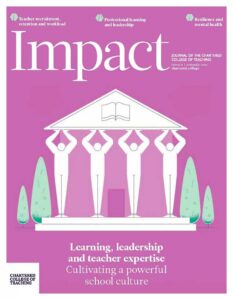Leading the primary curriculum: Developing subject leadership and expertise

How might primary school leaders ensure that all of their pupils have access to an excellent curriculum experience while also developing the leadership potential and expertise of their staff? Here I argue that distributed leadership that facilitates subject leadership and expertise can promote curriculum development. Drawing on educational research and my own experience, I suggest three practical principles for strong subject leadership.
The primary curriculum: An opportunity and a problem
The curriculum of the primary school presents an opportunity for both staff and pupils. The daily observations of the primary teacher will confirm that children are naturally curious about the world; some would even argue that a core aim of the curriculum, pedagogically enacted by the teacher, is to help them find knowledge, skills and understanding that channel their curiosity and take them beyond their everyday experiences (Young et al., 2014). But the curriculum is not only an opportunity for the pupils of our schools. With its vast array of subjects, the curriculum provides an opportunity for staff of all experience and leadership levels to collaboratively engage in curriculum development.
Therefore, the ‘opportunity’ of the primary curriculum is twofold: it can give pupils the chance to be immersed and initiated into the rich traditions of history, geography, music and other subjects, and it can provide the chance for staff (of all levels of experience within the school) to contribute to a common, collaborative goal and, in turn, develop their own expertise.
However, within a staff body of primary teachers, there is no guarantee that there will be a balance of teachers with passion and drive to lead every subject, or of those who have enough expertise to do so. This is evident in my own experience, and the Carter Review (DfEDepartment for Education - a ministerial department responsi... More, 2015) reported that teachers newly entering the profession may not necessarily have the same knowledge base (due in part to differences in teacher training). This presents problems for subject leaders, who may lack expertise in a particular curriculum area and have never had the opportunity to develop themselves further. It follows that if there is a lack of expertise among subject leaders in the primary school, it might be very difficult for the curriculum of that subject to be developed effectively.
So, leaders should consider how they will ensure that the curriculum is developed effectively in a way that provides for their pupils’ needs while also growing the subject knowledge and expertise of their staff.
Distributing the leadership of the primary curriculum
What can be done? The first part of my answer is seeing the leadership of the curriculum as a collaborative task, where all who teach are empowered to be part of the development process.
An important distinction ought to be made between formal leadership positions and the distribution of leadership within the primary school. Senior leadership (which is synonymous with formal leadership) has a large but indirect effect on student outcomes in schools (Rhodes and Brundrett, 2010). Although senior leaders are integral to the success of their pupils, it is class teachers who have the most contact with them. Senior leaders may set strategic vision and craft goals for their staff to deliver high-quality instruction but it is the teacher who delivers the curriculum, makes sense of it pedagogically and inspires students to take up the opportunities offered to them, and who therefore ought to have the agency to make it their own (Hargreaves and O’Connor, 2018).
Therefore, it is integral that senior leaders, if they want to ensure that the curriculum is collaboratively developed, distribute their leadership to ensure that all of their staff are being developed to reach their full potential. As Harris (2004) notes, ‘the job of those in formal leadership positions is to hold the pieces of the organisation together in a productive relationship… distributing leadership equates with maximising the human capacity within the organisation’ (p. 14). The core premise of this claim is that leadership is not bound in formal responsibilities or management structures; leadership ought to be dispersed, collective, collaborative and shared. Therefore, everyone who teaches the curriculum is responsible for the development of it, so everyone can make a meaningful contribution.
When the leadership of the curriculum is distributed, those who hold formal senior leadership positions ought to take on the role of empowering, coaching and developing leaders of subjects, who become the designated expert on their curriculum area in their school. A formal senior leadership position that distributes leadership may set an overarching vision and goals but, ultimately, if their leadership is distributed, they will expect teachers and other leaders to cultivate their own expertise and collaborate with colleagues.
Subject leadership for expertise: Three principles
If senior leaders empower subject leaders to become experts in their area, even if they would not consider themselves ‘experts’ before taking on their role, they ought to understand how this might be done and what effective subject leadership might look like. Here are three principles, supported by research but drawn from my own experience, that I would recommend that all senior leaders should be aware of and all subject leaders should adopt.
Principle 1: A deep understanding of the school context and community
There are two types of data that subject leaders need: data that helps to understand deficits and data that helps to understand the school community. Both are equally important. The curriculum is a tool to foster equality of opportunity; if it is to be used to its full potential, it must be rooted in knowledge of the pupils who attend the school. Whether this be a high proportion of SEN, Pupil PremiumAdditional funding for publicly funded schools in England to... More or low literacy rates, all of these should be accounted for and considered in the development of the curriculum of the subject. Where there is a need, each subject should consider how it meets this and takes pupils beyond their everyday experiences. In addition to this, it is important that subject leaders celebrate what is great about the school community in their subjects, while also offering alternative perspectives to deepen the learning of pupils.
Action: Subject leaders should begin with an understanding of their school community by creating subject audits and staff, pupil, parent and governor surveys related to their subjects, in order to gather as much ‘data’ as possible.
Principle 2: A commitment to ongoing professional development in the subject within a supportive network
Subject leaders should be engaged in developing understanding of best practice in their subject across the nation. There are some aspects of good practice that every subject shares; however, there are important distinctions between each that must be considered.
Within every subject there are concepts, knowledge and skills. Subject leaders need to know what these look like in every year group for their subject. In addition, they need to be able to help teachers in the school articulate how they work together, which ones should be taught first and how these three aspects of the subject fit together pedagogically. Once the concepts, knowledge and skills of the subject have been understood by a subject leader, it is important to then map this out into a clear progression of knowledge and skills. There are several ways that this can be done. It is not the document itself that is important, but the understanding that teachers have. In our context, we use knowledge organisers for knowledge progression, which we have checked among year groups to make sure that all of the vocabulary and facts are fully progressive, and the skills document is embedded within an understanding of what makes a good geographer/historian for that particular year group.
Action: There are excellent subject associations that subject leaders should join, such as the Historical Association, the Geographical Association and the D&T Association, which provide training and support for primary practitioners.
Principle 3: Commitment to the development of a strong subject leadership and management skill set
Subject leaders ought to be willing to develop and enact models of change, facilitation of skills and coaching techniques. If they have been adequately empowered to be fully responsible for their curriculum area and they are met with trust and respect, the subject leader sharing their understanding with their colleagues and helping others to teach their subject better should be a core aim. If senior leaders distribute their leadership of the curriculum, they should see themselves as those who develop leaders at all levels in their school: subject leadership provides an excellent opportunity to do this.
Action: Subject associations offer excellent training courses that might further bolster the development of subject leadership.
Conclusion
It is important to consider the implications of distributed leadership and these principles on a school, trust or local authority. Within a collaborative framework, the possibilities for curriculum development and subject expertise in the primary phase become possible, and this is especially pertinent within multi-academy trusts or local authority meetings of subject leaders. Curriculum development then becomes a shared endeavour of primary practitioners who are committed to improving the teaching of their subject. The opportunity that the distribution of curriculum leadership presents for primary teachers to develop themselves as specialists in curriculum areas is the first step on the road to primary subject expertise.
References
Department for EducationThe ministerial department responsible for children’s serv... More (DfE) (2015) The Carter Review of Initial Teacher TrainingAbbreviated to ITT, the period of academic study and time in... More (ITTInitial teacher training - the period of academic study and ... More). London: Department for Education.
Hargreaves A and O’Connor MT (2018) Collaborative Professionalism: When Teaching Together Means Learning For All. Thousand Oaks, CA: Corwin Press.
Harris A (2004) Distributed leadership and school improvement. Leading or misleading? Educational Management Administration and Leadership 32(1): 11–24.
OfstedThe Office for Standards in Education, Children’s Services... More (2019) The education inspection framework. Available at: assets.publishing.service.gov.uk/government/uploads/system/uploads/attachment_data/file/801429/Education_inspection_framework.pdf (accessed 23 March 2020).
Rhodes CP and Brundrett M (2010) Leadership for learning. In: Bell T, Bell L and Middleton D (eds) The Principles of Educational Leadership and Management. London: SAGE, pp. 153–175.
Young M, Lambert D, Roberts C et al. (2014) Knowledge and the Future School: Curriculum and Social Justice. London: Bloomsbury.










